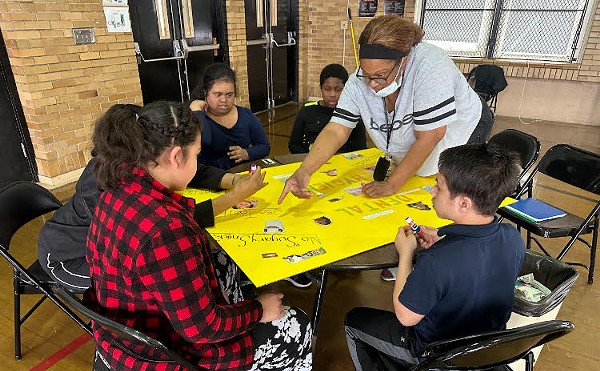Sen. Mitch McConnell’s very complicated relationship with the Tea Party continues to appear less cordial and more combative by the minute.
While McConnell’s re-election campaign continues to tout the endorsement of Sen. Rand Paul — who few doubt is the political movement’s most popular figure — the criticism of Kentucky and national Tea Party groups has escalated, centering on McConnell’s opposition to their effort to defund Obamacare at the end of this month, even if it means shutting down the federal government in the process.
Facing yet another attack along these lines by the Madison Project — a national group that has already endorsed McConnell’s primary opponent, Matt Bevin — McConnell’s campaign spokeswoman returned fire, referring to Bevin’s “small cadre of fringe friends.”
Though McConnell’s campaign later clarified that the “fringe” comment was directed at the national group “trying to stir things up that aren’t there,” the label stirred up long-present feelings among Tea Party activists back home in Kentucky who rankle at their belittlement as wacky extremists by the media and political establishment.
Last week, the leaders of nine Tea Party groups in Kentucky signed an open letter to McConnell blasting the comment, saying that if “limited government and individual liberty” are “fringe,” then they’ll proudly wear his label. One of the letter’s signees, Louisville Tea Party founder and president Wendy Caswell, countered previous attacks on her by McConnell’s campaign with a full-throated endorsement of Bevin in The Courier-Journal.
With open warfare between McConnell and Tea Party groups on the horizon for the next nine months until the Republican primary in May, many view this as his worst political nightmare, as he’ll be bloodied in a nasty inter-party fight and weakened going into the general election, if not face a shocking defeat like his favored candidate Trey Grayson in 2010.
However, it’s far too soon to conclude that this jousting with the Tea Party is a strategic blunder, as the battle may be 1) easily winnable and 2) allow him to emerge as a stronger candidate in the general election.
While Tea Party criticism of McConnell is certainly vocal, many believe their actual base of support among voters has seriously atrophied since the 2010 zenith, and their influence is exaggerated. Rand Paul’s favorable numbers in Kentucky remain relatively high, but polls have shown a dip in membership and identification with the Tea Party throughout the last few years.
If Republican voters have stronger allegiances with McConnell or Paul than Tea Party leadership, McConnell might just weather the storm in the primary and position himself favorably with more moderate voters going into the general election next year — particularly the large number of conservative Democrats who typically swing federal elections in Kentucky.
On the other hand, if McConnell’s trademark slash-and-burn campaign tactics backfire, he risks alienating a large segment of the Republican base that could sit home in protest next November — unable to “hold their nose” — canceling out whatever he gains among moderates.
Though McConnell has spent most of his energy counterpunching Matt Bevin over the past month, last Friday his campaign held a “Women for Team Mitch” event in Louisville, clearly eyeing a key demographic he’ll need to be competitive with in his presumptive race against Democrat Alison Lundergan Grimes next fall.
At the event, several women gave personal testimonies of McConnell assisting them at times of need, but several of the points made in his favor conflicted with his actual voting record on women’s policy issues.
The press packet handed out by his campaign featured a quote touting McConnell as a “co-sponsor of the original Violence Against Women Act.” While McConnell was indeed a co-sponsor of the first version of the bill that failed in 1991, he withdrew his name from the bill that eventually became law in 1994, which he voted against. McConnell also voted against re-authorization of VAWA in 2012 and 2013, with his office saying that it “could strip Americans of their constitutional rights.”
A McConnell staffer also gave an emotional account of the senator letting her leave work to care of her child that was diagnosed with cancer, telling her she could return to her position whenever she was ready. However, McConnell was required to do so by federal law, specifically the Family Medical Leave Act of 1993 — which McConnell also voted against.
McConnell’s wife, Elaine Chao, touted his support for increased funding for breast cancer research and screenings for poor women, but neglected to mention his strong opposition to the Affordable Care Act, which he wants to throw out “root and branch.” Some of those roots and branches include free cancer screenings for thousands of women in Kentucky, increased access to health insurance for women near and under the poverty line, and the prohibition of insurance companies charging women more than men.
Grimes’ campaign has been busy hammering McConnell for his votes against pay equity legislation such as the Lily Ledbetter Act and the Paycheck Fairness Act, and unless his campaign is able to cloud the record on his voting past, women voters could be his biggest obstacle to a sixth term.
Alison Lundergan Grimes has managed to slip under the radar recently as McConnell and Bevin publicly squabble, rarely taking policy questions from local press. At one of those occasions where she fielded questions two weeks ago, LEO asked Grimes if she believes that the burning of fossil fuels contributes to climate change. She punted on the question, saying she’ll have plenty of time to reveal all of her policy positions in the long campaign.
While Grimes is eager to deflect McConnell’s attack that she is an ally of President Obama’s so-called “War on Coal,” admitting she is not a denier of clear scientific consensus should not be that difficult.
We’re still waiting for her simple answer to this simple question.





